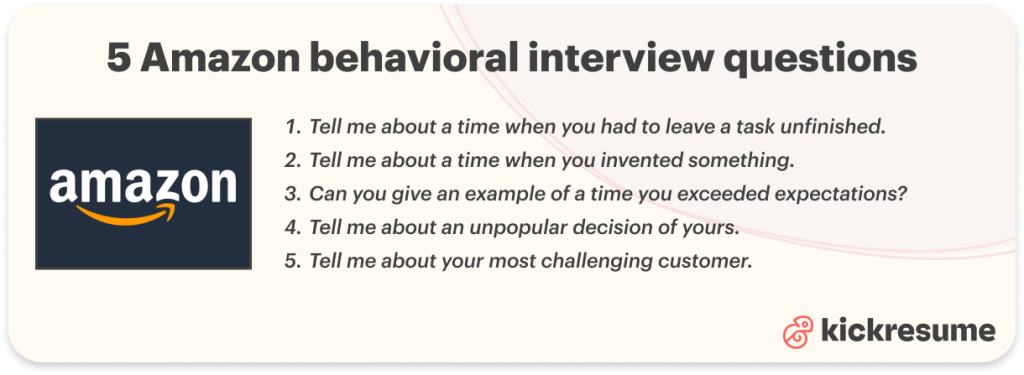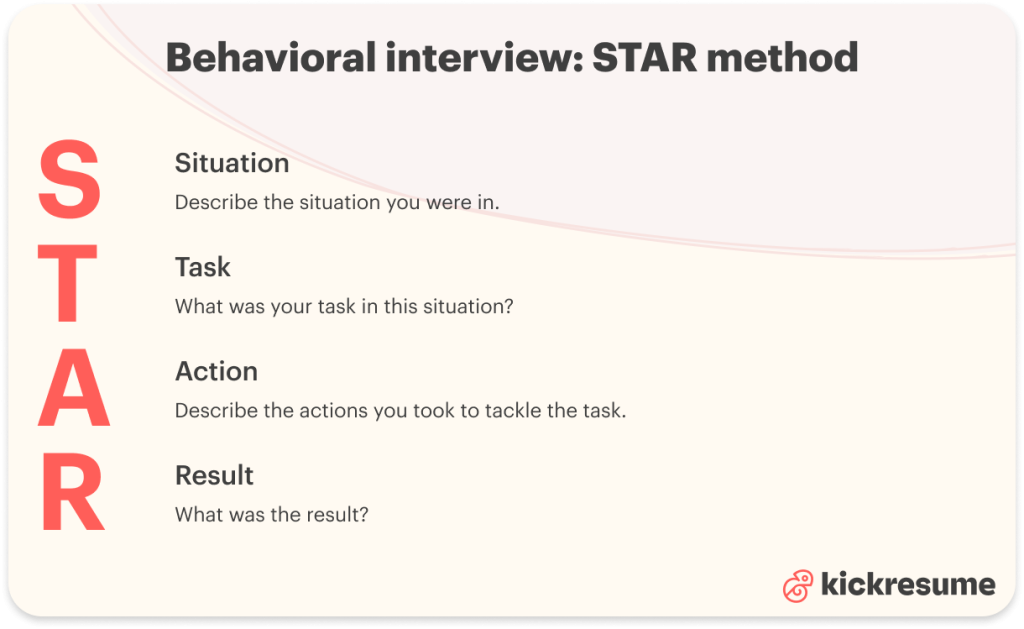What's more stressful than a job interview? A behavioral job interview, brimming with behavioral interview questions that really make you sweat.
These aren't your standard questions like "Tell me about yourself" No, these questions take you on a deep dive into your past work experiences, challenging you to come up with real-life situations on the spot.
Though it might seem tough to prepare for these kinds of questions, there's good news. There are methods out there that can help you craft solid answers to almost any behavioral question thrown your way.
In this guide, we've put together everything you need:
- the 30 most common behavioral interview questions, including 10 questions asked by big names like Amazon
- sample answers that can guide your preparation
- overview of the STAR method to help you ace any behavioral question
By the end of this article, you'll have the tools and confidence to tackle these tough questions and make a memorable impression in your next behavioral interview.
What is a behavioral interview?
Have you ever walked into an interview thinking it's going to be the same old Q&A session, only to find yourself in the hot seat, recounting your entire work history?
Welcome to the world of behavioral interviews.
So, what exactly is a behavioral interview? A behavioral interview is a technique used by employers to understand how you've handled real-life situations in your past work experiences. It's based on the belief that past behavior is the best predictor of future performance.
Essentially, imagine an interview where the questions aren’t about what you can do, but about what you have done. It’s like the interviewer has a crystal ball, but instead of predicting the future, they want to take a deep dive into your past.
The idea is simple: your past behavior is the best predictor of your future performance.
These interviews can feel like a trip down memory lane, but it's not just about reminiscing. Each question is a key that unlocks a story about your skills, decision-making, and adaptability in real-life work situations.
It’s not just, “Do you work well under pressure?”
It’s more, “Tell me about a time when you had to work under extreme pressure.”
Behavioral interviews vs. situational interviews
When it comes to job interviews, behavioral and situational interviews are similar in that they both ask for complex answers, not just a simple 'yes' or 'no.'
In both types, you're not just listing your skills; you're demonstrating them through your answers. But here’s where they part ways: one looks back, and the other looks forward.
Now, let's break down the key differences:
Let's take a closer look:
- Behavioral interview: Focuses on the past and asks questions about your actual experiences and actions in specific situations. For instance, you might be asked, “Tell me about a time when you had to meet a tight deadline.”
- Situational interview: Concentrates on the future, using hypothetical scenarios to gauge how you might handle potential challenges. A common question could be, “What would you do if you faced an impossible deadline?”
One advantage of situational interviews is that they level the playing field. Employers can put all candidates in the same hypothetical situation and compare their answers.
This makes it easier to compare candidates directly because everyone's answering the same 'what if' question.
But remember, whether you’re reflecting on the past or predicting the future, the key is to show how your skills and mindset make you the right person for the job.
What are behavioral interview questions?
Behavioral interview questions are a favorite tool in an interviewer's kit. Why?
Because they reveal a lot more about you than your typical Q&A.
But how do employers come up with behavioral interview questions? It's not as random as it might seem. Employers often start with the key competencies and skills that are crucial for the job. They then craft questions that help them understand how candidates have demonstrated these qualities in real-life situations.
Why do they like asking them? Well, past behavior is a great predictor of future performance. These questions let employers peek into your professional history to see how you've handled challenges, solved problems, and worked with others. It's like a sneak preview of what you might bring to their team.
Let's dive into some key characteristics of behavioral interview questions:
- Specificity. These questions are detailed. They don't want to know if you're good at something in general; they want a specific example of a time you demonstrated a skill or handled a situation.
- Real-life situations. Expect to talk about actual events from your past work experiences. You’ll need to recall times when you solved problems, faced challenges, or achieved something significant.
- Skill-focused. Each question targets a specific skill or competency, like teamwork, leadership, problem-solving, or adaptability. Your answers should highlight how you've effectively used these skills.
- Open-ended. These questions don't have a right or wrong answer. They're designed to get you talking and sharing stories about your experiences.
Now that you're getting a handle on what these questions are all about, you might be wondering, "What kind of questions can I expect?"
Stay tuned for the next chapter, where we'll dive into the 20 most common behavioral interview questions – you might just find a few that you'll need to prepare for!

30 Common Behavioral Interview Questions
Navigating behavioral interviews can feel like a minefield, but knowing what to expect can make all the difference.
Here are 20 common behavioral interview questions, gathered from various reputable sources, like Yale University or University of Sydney.
Keep in mind, these questions are designed to get you to share detailed, specific examples from your past work experiences.
- Tell me about a time when you had to work closely with someone whose personality was very different from yours. (Teamwork Question)
- Describe a time when you had to interact with a difficult client or customer. What was the situation, and how did you handle it? (Customer Service Question)
- Tell me about a time you were under a lot of pressure. What was going on, and how did you get through it? (Adaptability Question)
- Give me an example of a time you managed numerous responsibilities. How did you handle that? (Time Management Question)
- Tell me about a time when you had to rely on written communication to get your ideas across. (Communication Question)
- Tell me about your proudest professional accomplishment. (Motivation Question)
- What’s a project or accomplishment you’re proud of? (Top Behavioral Interview Question)
- Tell me about a time you had an interpersonal conflict at work. (Teamwork and Collaboration Question)
- Tell me about a time you had to tell someone no. (Communication Question)
- Tell me about a time you led a project. (Leadership and Management Question)
- Recall a time when you weren’t sure how to solve an issue. Walk me through how you resolved it. (Problem Solving Question)
- Can you recall a high-pressure job situation from your past? (Personal Stress and Adaptability Question)
- Tell me about a time when you exceeded expectations. (Success, Failure, and Self-Reflection Question)
- Tell me about a time you had to work with someone with a very different work style than you. (Teamwork Question)
- How do you handle setbacks at work? (Resilience Question)
- Tell me about the last presentation you made. How did it go? (Communication Question)
- What is the biggest challenge you’ve faced? How did you overcome it, and what did you learn? (Challenge Question)
- How do you handle multiple and competing deadlines? (Time Management Question)
- What do you do if you don’t understand the project assignment? (Problem Solving Question)
- How do you handle a lot of stress or pressure on the job or in school? (Stress Management Question)
- Tell me about a time you failed at work. (Resilience Question)
- What personal traits make you stand out for this role? (Position-Specific Question)
- Describe a situation in which you had to apply your skills to learn a new technology/ process. (Analytical Question)
- Provide an example of a time when you offered an innovative solution to a difficult problem. (Creativity Question)
- Tell me about a complex problem you solved—walk me through your thinking as you solved it. (Analytical Question)
- What makes you a good team member? (Teamwork Question)
- Describe a situation in which you were able to successfully convince someone to see things your way. (Communication Skills Question)
- Describe a difficult situation that you feel you should have handled differently. What did you learn? (Management Skills Question)
- Give me an example of how you demonstrate initiative. (Drive Question)
- Tell me about a time when you provided outstanding customer service. What was the situation and what did you do? (Sample Behavioral Question)
Each of these behavioral interview questions targets specific aspects of your professional experience and skills. When preparing your answers, think about situations that best illustrate your abilities in these areas.
Remember, the key is to provide concrete examples that demonstrate your competencies and how they align with the role you're interviewing for.
Amazon behavioral interview questions
Firstly, it's a well-known fact that Amazon takes its behavioral interviews seriously.
When you're preparing for an interview with this tech giant, expect to encounter a barrage of questions starting with “Tell me about a time you…”
These aren't just random inquiries; they are meticulously designed to probe your soft skills, aligning closely with Amazon's 16 leadership principles.
We've dived into the depths of Glassdoor data, where real people share their actual interview experiences, to bring you 10 real Amazon behavioral interview questions asked in various Amazon job interviews:
- Tell me about a time when you had to leave a task unfinished.
- Tell me about a time when you had to work with incomplete data or information.
- Tell me about your most challenging customer. How did you resolve their issues and make them satisfied?
- Tell me about a time when you invented something.
- Tell me about a time when you had to work with limited time or resources.
- Tell me about an unpopular decision of yours.
- Tell me about a time when you realized a project needed changes.
- Think about a time you received negative feedback. How did you deal with that?
- Can you give an example of a time you exceeded expectations?
- Tell me about a time when you gave a simple solution to a complex problem.
How to answer behavioral interview questions
Tackling behavioral interview questions can feel like crafting a compelling story.
You want to be clear, relevant, and leave your interviewer impressed.
Here's some tips on how to do just that:
- Prepare a mental catalogue of situations. Before the interview, sit down and recall different situations from your past work experience. Create a mental library of scenarios you can draw from. This preparation will make it easier to quickly pull relevant examples during the interview.
- Be specific. Think of a specific incident that clearly demonstrates your skills or how you handled a situation. For example, instead of saying, "I'm good at problem-solving," describe a particular problem you solved, how you approached it, and the solution you implemented.
- Stay relevant. Tailor your stories to the job and align your examples with the job's requirements. If you're interviewing for a leadership role, focus on situations where you led a team or project successfully.
- Keep it positive. Spin a positive yarn, even from a negative situation. Focus on what you learned or how you improved. For instance, if you talk about a conflict, emphasize how it was resolved and what it taught you about teamwork or communication.
- Use STAR method.This is a handy tool for structuring your responses, and we'll explore it more in the next chapter.
Example question and answer
Question: "Tell me about a time when you had to work on a tight deadline."
Answer: Last year, in my role at XYZ Corp, we faced an unexpected deadline for a major project after a key team member became ill. I stepped up as the interim lead, quickly reassessing the workload and reallocating tasks based on each team member's strengths. I also established daily check-ins to track our progress and maintain open communication. Despite the time crunch, we successfully delivered the project on schedule. This experience reinforced the value of adaptability, clear communication, and teamwork under pressure.
STAR interview method
The STAR interview method is a helpful framework for answering behavioural interview questions. It's well-established, widely used, and recommended by career professionals across various industries.
The beauty of the STAR method lies in its simplicity and effectiveness. It helps you structure your responses in a way that is both comprehensive and engaging for the interviewer.
Let's break down each component of this method:
- S for Situation: Start by painting a picture of the context. Where did this situation occur? When did it happen? What were the key factors involved?
- T for Task: Define your specific task/role or challenge in that situation. What were you responsible for? Were there any expectations placed on you? What was your objective?
- A for Action: Describe the actions you took to address the task. What steps did you take to resolve or manage the situation? How did you approach the challenge? Who did you work with or coordinate?
- R for Result: Conclude with the results or impact of your actions. What was the outcome? Did you learn anything? What was the impact on the team or company?
Clearly, the best way to understand the effectiveness of the STAR method is to see it in action. Let's walk through an example to demonstrate how each component comes together to form a coherent and impactful response.
Example answer using STAR interview method
Question: "Tell me about a time when you had to overcome a significant challenge."
Answer:
- Situation: "In my previous role at XYZ Inc., we faced a significant decline in customer satisfaction scores."
- Task: "As the customer experience manager, it was my responsibility to identify the root causes and improve our service quality."
- Action: "I initiated a customer feedback survey, analyzed the data to identify key issues, trained the team on new service protocols, and introduced a follow-up process for customer complaints."
- Result: "Within three months, our customer satisfaction scores improved by 30%, and we regained our leading position in the industry satisfaction rankings."

Key takeaways: Behavioral interview questions
Behavioral interview questions are not your typical interview questions. These require you to reflect on your past experiences and specific situations and on how they've shaped your approach to work challenges.
While behavioral interview questions are gaining popularity, traditional interview questions still dominate the landscape. Hence, don’t forget to prepare for other common interview questions like:
Tools like Kickresume's Interview Questions Generator can also come in handy. This AI-powered tool tailors common interview questions to your industry and role, ensuring you're well-prepared for any interview scenario.
Finally, let’s not forget the cornerstone of your job application: your resume. The importance of having a well-crafted, job-specific resume cannot be overstated. The AI resume writer tool can generate tailored resumes with the help of AI in a few clicks so you don't have to spend your days crafting resumes.
FAQ: Behavioral interview questions
- What are the top 10 behavioral questions in an interview?
1. Describe a time when you had to interact with a difficult client or customer.
2. Tell me about a time when you had to work on a tight deadline.
3. Tell me about a time when you faced a significant challenge at work. How did you handle it?
4. Describe a situation where you had to work closely with a difficult colleague.
5. Give me an example of a time when you showed initiative at work.
6. Tell me about the last presentation you made. How did it go?
7. What’s a project or accomplishment you’re proud of?
8. Tell me about a time you had an interpersonal conflict at work.
9. Tell me about a time when you had to adapt to a significant change at work.
10. Think about a time you received negative feedback. How did you deal with that? - How do I prepare for a behavioral interview?
To prepare for a behavioral interview, reflect on your past work experiences and identify examples that showcase your problem-solving, teamwork, leadership, and adaptability skills. Practice articulating these experiences clearly and concisely, using the STAR method (Situation, Task, Action, Result) to structure your responses. Research the company and align your examples with their values and the job's requirements.
- How to answer behavioral interview questions?
To answer behavioral interview questions effectively, use the STAR method: Start by describing the Situation, clarify your Task or role, detail the Actions you took, and conclude with the Result or outcome. This framework helps structure your response, ensuring it's clear and highlights your skills and problem-solving abilities in a concrete, relatable way.
- What is the difference between a behavioral interview and a situational interview?
While behavioral interview focuses on the past and asks questions about your actual experiences and actions in specific situations, situational interview concentrates on the future, using hypothetical scenarios to gauge how you might handle potential challenges.



